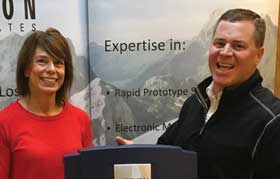
MANA member Alan Lupton II points to a number of college experiences as the beginning of his interest in a sales’ career.
Being able to call your own shots, not to mention being rewarded commensurate to your efforts are just two of the reasons that Alan Lupton II was attracted to a career as an independent manufacturers’ representative. That initial attraction has served him well as he finds himself today as president of Lupton Associates, Canandaigua, New York.
As he looks back at the career path he has followed Lupton notes that “Growing up I watched my father being in a position where he decided what he was going to do and being compensated for his efforts. That’s what got my attention.”
Lupton’s father, Alan Sr., founded Lupton Associates in 1969. The 14-person agency provides engineered products for OEMs and contract manufacturers.
Lupton recalls that his early interest in a sales career was spurred by his ability to be successful in his activities with other people in a leadership role. And, some of his college activities pointed him in the direction of the career he has followed. As a student at the University of Vermont, he was involved in student government that pointed him in the direction of being able to identify and solve marketing opportunities. “As a sophomore I was the student government treasurer overseeing the student government budget of $900,000. I worked with a comptroller, finance manager and a secretary and virtually oversaw the student budget. In that position I saw that some areas were not being served. For instance, freshmen weren’t allowed to have cars on campus. As a result, there were transportation problems for them. I went out and purchased $130,000 worth of mountain bikes for the freshmen. We communicated with incoming freshmen and asked them if they wanted to purchase bikes and we had them waiting for them when they arrived on campus.”
Spurred by that success, during his junior year, the ski environment of Vermont presented another opportunity. “Since there were logistical problems allowing the students to travel to ski venues, Lupton put $60,000 in place from the Student Government Budget to provide transportation to the slopes and managed to sell $400,000 in ski passes to students. That’s compared to $50,000 the previous year.
Looking for Work Elsewhere
Once out of college he notes that he interviewed for jobs other than with his father’s agency. “I did that because no one ever said anything to me about joining Lupton Associates. When I told my father I intended to take a job with another company, he asked me why I didn’t want to join him.” But, join him he did. Based in Boston, he provided coverage in New England calling on accounts that included Compaq, Intel, Cisco, Nortel and various contract manufacturers.
In 1996 he relocated to Rochester, New York, and developed relationships with key accounts in New York State. In 2003, he completed the purchase of the agency from his father.
(His agency’s succession plan was described in the January 2014 issue of Agency Sales. Commenting on the succession plan, Lupton notes, “At the time we were planning the succession between my father and myself, I probably thought I was paying too much and he might have thought I was paying too little. All in all though, things have worked out quite well owing to the extensive planning we did and the good counsel we had at our disposal. I’d say we’ve done quite well with the plan and managed to stay way ahead of the curve.”)
In the past 18 years Lupton has traveled with the agency’s sales team in all territories providing management oversight, supporting the development of strategic accounts, assisting with program management, coaching, marketing and business development in all areas.
As he has overseen the agency’s operations, Lupton notes that he’s observed a number of changes in the way independent manufacturers’ representatives operate today vs. when he first joined the agency. Perhaps the most telling element of change that Lupton encountered was the advent of CRM. As he recalls it from his early days with the agency, “When I started there were no computers. Everyone kept their customer information in notebooks and using the fax machine was commonplace. Implementing CRM — we use Goldmine now — was expensive, but it’s the kind of thing people take for granted today.”
Technology’s Help
Lupton also notes how the times have changed for agents when it comes to calling on customers. “We used to spend so much time driving around making sales calls. We were always visiting customers to pick up drawings and dropping off samples. Now, through the use of media that technology provides us, keeping in touch with customers is much easier. But one thing that hasn’t changed is the need for sales.

Zack Hicks (left), Lupton’s newest hire in outside sales covering parts of New England, Eastern NY and Quebec, and Alan Lupton and examine one of their principals’ products.
“There are people today who question the role of the rep. They’ll question whether the rep model of going to market is dying. I’d maintain the role is as strong today as it’s ever been. It’s strong because the need for new business never diminishes. We continue to grow because we’re the ones who provide the basics. We continue to invest in our companies and take no short cuts. It’s the seeds we plant today that we’ll sow in two or three years.”
He continues with the opinion that “I wouldn’t want to be the direct guy today. It’s got to be hard for the direct guy because all he has to sell is one thing. Contrast that with what the rep offers and we have the advantage. We provide several options for the customer that consistently provides us with a seat at the table.”
Education and Communication
There’s obviously an element of education involved in communicating the options that the agency provides to customers. Commenting on that, Lupton says that process isn’t all that difficult. “The people in our agency have generally been with us for 20-plus years. As a result, that wealth of experience provides us with an advantage when it comes to communicating with customers. We’re able to let them know that we’re in this for the long haul. I’ve had customers tell us that they appreciate the fact that one of our salespeople can come in and talk to them and even if they’re not chosen for an order, we’ll be there for them in the future.”
Given a more than 20-year tenure Lupton boasts about with his agency’s personnel, the need to find new people doesn’t come up all that often for Lupton Associates. When it does, however, “We tend to hire from outside our industry. In general, we’re looking for someone with an engineering background and 10-years experience. We seek out people who are intelligent, have an aptitude for sales and people that our principals and customers want to be successful. What we’re trying to do is build a bench that better serves our customers and principals.”
If that’s what Lupton Associates is looking for in personnel, the agency espouses a similar philosophy when it comes to adding principals to its line card. “We don’t say ‘yes’ all that often when prospective principals contact us. We’re more focused on building business with existing principals.” When the need arises, however, he says the agency makes use of the MANA online directory and other industry resources.
Areas of Concern
While attracting new personnel and principals don’t appear to be major concerns for Lupton Associates, Lupton says that there are plenty of other areas of the business that continue to demand his and his agency’s attention.
Social Media and Communications — Lupton explains that his agency makes use of LinkedIn and Facebook primarily for branding and lead generation purposes. “Our goal is to keep our name out there in front of everyone in the marketplace.” He adds that “We started branding ourselves vs. representing our principals’ brands about five or six years ago. We’ve done that to the extent we use our agency business cards vs. those of our principals.”
He also notes that Lupton Associates publishes an electronic newsletter that has been effective to the point where customers let him know that they have seen and read it and we generate several additional RFQ’s per month as a result.
On the subject of how best to communicate with customers given all the options agents have at their disposal, he says, “There is no single answer. Some customers I simply can’t get on the phone and I’m not sure they regularly read their e-mail. That’s why it’s important to learn how the customer wants to be communicated with (phone, e-mail, text, etc.) and tailor your approach accordingly.” He adds that it’s certainly become common with the younger generation that e-mail and text works well.
Shared Territorial Development Fees — “This is something I really don’t believe in,” says Lupton. “My opinion is my business model calls for me to make an investment in terms of time, money and effort, to make things happen for the principal in the territory. If you’re going to pay me on the front end, that can take away my incentive on the back end. I find that we make our best customer contacts on the front end. That’s what works best for us. We’d be breaking our business model if we asked for money on the front end.”
He continues that his agency’s business model might be different than others. “We’ve worked this way for more than 30 years. Our focus has been that if we want to fill a niche in our line card, I’ll sign with people that I want to make sales calls for. By operating that way, we’ve always given them our full offering.”
Long Sales Cycle — “The key here is to keep the pipeline full,” explains Lupton. “Just about all of our principals appreciate the fact that the industry we work in requires a long sales cycle. That’s why we have 12- and 24-month cancellation agreements with our principals. Whatever we’ve sold, we are paid for.”
MANA — Lupton Associates has been a member of MANA since 1974, having joined during the tenure of Alan Lupton Sr. According to Lupton II, “MANA is the professional organization that supports us. I’d have to say that we do most if not more than all of what MANA suggests that an independent manufacturers’ representative do. They set a very good base line for us to follow and they have served us extremely well, especially in the last five to 10 years.”
The Future — Looking to the future of the profession he’s chosen as his career, Lupton says that “I’ve spoken with a number of people who are retiring and it’s surprising to me that many of them have said they can’t understand why someone would be interested in the rep business as a profession. I couldn’t disagree more. I’m really bullish on the profession. I think there are so many opportunities and the challenges that are presented are very rewarding. Now, having said that, you had better be well capitalized and ready for the long haul. And, you had better have a great team in place. We’re fortunate that we have the team and we’re always helping each other. I would definitely recommend the rep profession to others.”
The Lupton File
- Lupton Associates
Canandaigua, New York
Alan Lupton II, President
www.marninc.com - Established: 1969
- Joined MANA: 1974
- Personnel: 14
- Products: Custom engineered components
- Founded in 1969 by Alan Lupton Sr., Lupton Associates provides engineered products to OEMs and contract manufacturers. With a service record to many of its principal of more than 25 years and an average employee tenure exceeding 20 years, Lupton Associates has grown to become a leading solutions provider in the North American manufacturing industry.
MANA welcomes your comments on this article. Write to us at [email protected].



